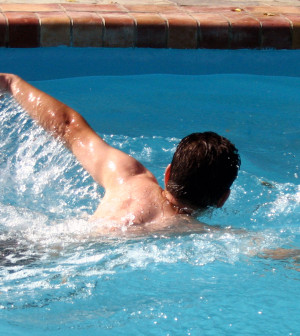- Could Your Grocery Store Meat Be Causing Recurring UTIs?
- Are You Making This Expensive Thermostat Error This Winter?
- Recognizing the Signs of Hypothyroidism
- 10 Strategies to Overcome Insomnia
- Could Artificial Sweeteners Be Aging the Brain Faster?
- Techniques for Soothing Your Nervous System
- Does the Water in Your House Smell Funny? Here’s Why
- Can a Daily Dose of Apple Cider Vinegar Actually Aid Weight Loss?
- 6 Health Beverages That Can Actually Spike Your Blood Sugar
- Treatment Options for Social Anxiety Disorder
Sleep Woes for Astronauts May Pose Risks in Space: Study


Lack of sleep is common among astronauts before and during spaceflight, and their widespread use of sleeping pills could pose a safety threat, a new study suggests.
Researchers analyzed the sleep habits of 64 astronauts on 80 space shuttle missions and 21 astronauts on International Space Station missions before, during and after their time in space.
In total, the team examined more than 4,000 nights of sleep on Earth and more than 4,200 nights of sleep in space, according to the study in the Aug. 8 issue of The Lancet Neurology.
NASA schedules 8.5 hours of sleep per night for crew members while in space, but astronauts’ average amount of sleep per night was just under six hours on shuttle missions and just over six hours on space station missions.
Only 12 percent of sleep sessions on shuttle missions and 24 percent of space station missions lasted seven hours or more, compared with 42 percent and 50 percent, respectively, after the astronauts returned to Earth, the findings showed.
The researchers also found that lack of sleep began long before launch, with astronauts averaging less than 6.5 hours of sleep a night during the three months of training before they went into space. That’s about half an hour less per night than the average American adult.
“Sleep deficiency is pervasive among crew members. It’s clear that more effective measures are needed to promote adequate sleep in crew members, both during training and spaceflight, as sleep deficiency has been associated with performance decrements in numerous laboratory and field-based studies,” study author Dr. Laura Barger, of Brigham and Women’s Hospital and Harvard Medical School in Boston, said in a journal news release.
The use of sleep medications was also reported by three-quarters of space station crew members and 78 percent of space shuttle crew members. Sleep medications were used by crew members on more than 52 percent of nights during space shuttle missions.
“The ability for a crew member to optimally perform if awakened from sleep by an emergency alarm may be jeopardized by the use of sleep-promoting pharmaceuticals,” Barger noted.
“Routine use of such medications by crew members operating spacecraft are of particular concern, given the [U.S. Food and Drug Administration] warning that patients using sleeping pills should be cautioned against engaging in hazardous occupations requiring complete mental alertness or motor coordination, including potential impairment of the performance of such activities that may occur the [following] day,” Barger said.
“This consideration is especially important because all crew members on a given mission may be under the influence of a sleep-promoting medication at the same time. In fact, on the four shuttle missions on which all crew members participated, all crew members reported taking sleep medications on the same night 6 percent of the time,” she noted.
Study co-author Dr. Charles Czeisler, of Brigham and Women’s Hospital, added: “Future exploration spaceflight missions to the moon, Mars or beyond will require more effective countermeasures to optimize human performance by promoting sleep during spaceflight. These may include modifications to schedules, strategically timed exposure to specific wavelengths of light and behavioral strategies to ensure adequate sleep, which is essential for maintaining health, performance and safety,” he explained in the news release.
More information
The U.S. Centers for Disease Control and Prevention has more about sleep.
Source: HealthDay
Copyright © 2026 HealthDay. All rights reserved.










